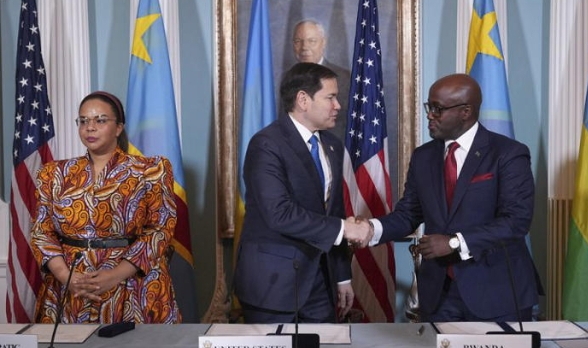Congo and Rwanda were set to submit a draft agreement on Friday to end the conflict in eastern Congo, following a declaration signed in Washington. Talks in Doha, with U.S. envoy Massad Boulous and international representatives, aim to address territorial sovereignty, armed groups, the mineral trade, refugees, and the role of international forces, particularly MONUSCO. The conflict escalated after Rwanda-backed rebels seized two provincial capitals in eastern Congo, pushing the government to engage in dialogue with the M23 group.
DR Congo and Rwanda Reach Preliminary Agreement Following Doha Talks


The Democratic Republic of Congo and the Republic of Rwanda were expected to submit a comprehensive draft agreement on Friday, which is aimed at bringing a lasting end to the protracted and deadly conflict in the eastern region of Congo. This conflict has caused immense humanitarian suffering and regional instability for years, and the upcoming agreement is seen as a critical step toward peace and reconciliation between the two neighboring nations.
This anticipated agreement is expected to reflect and uphold the principles outlined in a declaration that was signed in Washington, D.C., just one week ago. That declaration laid the groundwork for continued dialogue and mutual commitments to respect sovereignty, promote regional security, and work collaboratively toward long-term solutions to shared concerns.
Delegations representing the governments of Kinshasa and Kigali have been engaged in high-level negotiations in Doha, the capital of Qatar. These talks are intended to bridge their longstanding political and security differences. The meetings have provided a neutral and structured setting for both parties to voice their concerns and reach mutual understanding on contentious issues.
On Wednesday, the peace talks gained additional momentum and international attention when Massad Boulous, who serves as the United States President’s special envoy for Africa, arrived in Doha to participate in the negotiations. His presence underscored the level of international concern and commitment to supporting peace in the Great Lakes region. Alongside him were representatives from Togo and France—two countries also playing facilitative and diplomatic roles in the discussions—further demonstrating the broad international interest in seeing a resolution to the crisis.
The draft agreement under discussion is expected to address a wide array of sensitive and deeply interconnected issues. These include the protection of national territorial sovereignty, the disarmament and neutralization of armed groups operating in eastern Congo, the regulation of the lucrative and often illicit mineral trade that has fueled violence in the region, the humanitarian situation involving displaced persons and refugees, and the future role of international peacekeeping forces—particularly the United Nations mission in Congo, known as MONUSCO.
Tensions between the two countries have escalated in recent years, with Rwanda being accused of backing the M23 rebel group, which has carried out a number of offensives in eastern Congo. Earlier this year, rebels reportedly supported by Rwanda captured two key provincial capitals in the east. These advances significantly shifted the military and political landscape, ultimately pressuring the Congolese government in Kinshasa to adopt a more flexible stance regarding dialogue with the M23 movement—something it had previously resisted.
The international community continues to watch the developments closely, hoping that the agreement will mark a turning point in the conflict and pave the way for lasting peace and development in the region.

 বাংলা
বাংলা  Spanish
Spanish  Arabic
Arabic  French
French  Chinese
Chinese 
